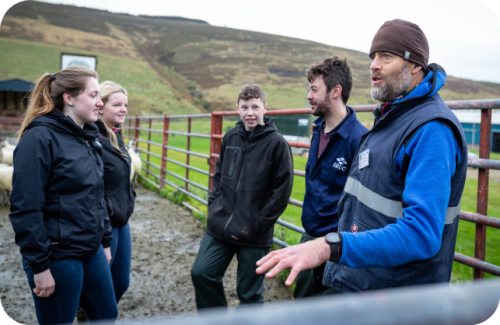Over the past decade, the European Commission has invested in a series of measures designed to support innovation in agriculture through networking all those involved in Agricultural Knowledge and Innovation System (AKIS): farmers, advisors, supply chain members, NGOs and researchers.
In this project, we identified opportunities to align Scotland’s Agricultural Knowledge and Innovation System (AKIS) policies with their European counterparts. We focused particularly on the outcomes of the requirement for each European member state to include an AKIS plan within their strategic plans for the 2023-2027 Common Agricultural Policy (CAP).
(Image credit: SRUC)

Stage
Directory of Expertise
Purpose
The Scottish Government’s ambition is to become a global leader in sustainable and regenerative agriculture, aligning measures and policies (where possible), with the European Union. Through its Vision of Agriculture Support Package Beyond 2025, Scottish Government is considering how to improve cooperation and collaboration between the diverse actors within the AKIS (Agricultural Knowledge and Innovation System). Where practical, the Scottish Government seeks to align support for Scottish agriculture with EU measures and policy developments.
In this SEFARI Gateway funded fellowship we assessed the impact to date of the AKIS measures identified in European member states’ Common Agricultural Policy (CAP) Strategic Plans (2023-2027). As these changes were relatively recent, we emphasised how the discussions that took place to agree the AKIS measures made an impact, as well as the initial impacts from implementing those measures. The overall aim was to inform Scottish Government about processes which had worked well, and ones which had not.
Results
There have been a number of European Commission-funded projects which assessed various aspects of AKIS in Europe, as well as guidelines for developing and subsequently evaluating CAP Strategic Plans. We reviewed this literature, and held focus group discussions with representatives of 10 Western and Southern European countries (14 workshop participants).
Key impacts of CAP AKIS Strategic Plans
We found three key impacts.
- The first was an increased understanding at national government level of AKIS and innovation processes in agriculture. This is because in order to develop AKIS plans, Member State officials first needed to understand what they were developing plans for.
- The second primary impact was the establishment of ‘AKIS Coordination Bodies’. Establishing these groups – which were typically located within existing government departments - was required by the European Commission. These groups are responsible for organising AKIS activities such as networking events, and setting strategic direction.
- The third impact was the increased prioritisation of activities which support peer-to-peer learning among farmers. The European Commission has been supporting what they term ‘interactive innovation’ – recognition that farmers themselves are innovators, and often learn best from other farmers. This is distinct from provision of expert advice e.g. by agricultural advisors. Monitor farms, discussion groups and farm visits are examples of peer-to-peer learning processes, which promote interactive innovation.
We also found investment in AKIS measures and the profile of AKIS participants increased in some countries. The act of developing a new strategy for AKIS led to resources being dedicated to implementing that strategy. However, in some countries (particularly where a lot of resources were already dedicated to AKIS) the changes were minor.
Key Issues in Advancing AKIS
Through the focus groups, we also learned that AKIS is not well known as a term. It was well known to us as participants in several European Commission-funded research projects, but it became apparent that this term is only familiar to participants in these projects. In order to effectively develop the AKIS in Scotland, the meaning of the term AKIS will need to be part of the process. It will also be important to ensure that the full range of AKIS actors is involved (i.e. including private ‘fee-for-service’ advisors who may see participation as a lost opportunity to earn income), and farmers who are busy, located in remote regions or otherwise ‘difficult to reach’.
Options for developing Scotland’s AKIS in line with European policies
Our study identified some useful options for developing Scotland’s AKIS. The clearest is to establish an AKIS coordination body. The focus group participants had a number of suggestions for how this group could function:
- Give this AKIS coordination body the power to agree strategic direction.
- Map the AKIS actors in Scotland at regular intervals, to be sure they are included in activities
- Build on existing structures, i.e. utilise and designate staff within existing government departments or organisations.
- Regularly evaluate the performance of the AKIS
- Build on the Scottish Rural Network or FAS platform to mobilise actors and promote activities.
The focus group participants also thought that it could be helpful to hold regular ‘AKIS gatherings’ to enable participants to network and learn from each other. Aligning other policies from other sectors with the overarching AKIS strategy would help it become well recognised and supported. The focus group participants had found topical hubs to be helpful in their own countries, as well as additional support for peer-to-peer learning.
Benefits
The research provided rapid evidence synthesis and key informant input to inform the design of support for AKIS within the Vision of Agriculture Support Package Beyond 2025 – currently expected to come into operation by April 2027. It drew on the networks established by SEFARI researchers through leadership and participation in European Commission-funded projects over the past decade, to bring together expert feedback on AKIS strategic plans across 10 European countries. Study findings are expected to directly inform the development and evaluation of Tier 4 of the Support Package for farmers and crofters, under the Agriculture and Rural Communities (Scotland) Act (2024).
Project Partners
The James Hutton Institute
University of Aberdeen